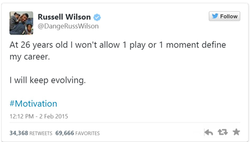
Whatever you do,
Be in love.
Rumi, A 12th century Sufi Mystic
***
In this past weekend’s Superbowl, the Seattle Seahawks loss at the last minute was totally unexpected. In retrospect, and as all of the USA knows by now, the call to have Russel Wilson pass the ball instead of covering the last yard with brute force, turned out to be their undoing. Wilson could have barraged the internet with posts of self-pity, place blame on his coach and team mates, and perhaps even use the kiss of death: taunt the public. Instead of flooding his mind with negativity, the young QB admitted his defeat and looked for a way to grow. He was kind and compassionate to himself. I am now a fan.
At a surface level, self-compassion may be mistaken for self-indulgence. These are two very different feelings. Self-indulgence occurs when one takes actions for self-defeating purposes. On one extreme, self-indulgent individuals over-indulge in activities that allow them to be surrounded be people, because they feel inadequate. They need love and friendship on their own terms. They have a fear of facing themselves, and constantly engage in activities like shopping, dating, etc. At another extreme, self-indulgent people may over-indulge in needing attention. They have self-deprecating thoughts, such as “I am a loser,” “No one likes me,” and “My life is worthless.” In this extreme, one also has FOMO (Urban Dictionary: Fear of Missing Out). This self-indulged person becomes a tormented writer of his/her journey where there is no escape from self-inflicted wounds. Despite the specifics of the type of indulgence, self-indulgent people fall into what is called as the “Setting Sun Mentality.” Hyper emotions and desires deaden the soul of man, and create a realm of nightmares.
Self-compassion, on the other hand, is when one tries to deeply understand their root feelings and works to be happy and healthy. While this may be difficult, the long term payoffs are positive, whereas self indulgence gives temporary and superficial pleasure.
Self-indulgence is easy to engage in. On the contrary, self-compassion requires a journey deep into one’s psyche that necessitates the strength of a warrior. The journey may look like a travel into unfamiliar foreign lands. However, one should remember this land always existed, and the traveler is the foreigner seeing himself/herself differently for the first time.
In the words of Apostle Paul, “When we are honest about our frustrations and pains and respond to ourselves in this pain with love: that heals.” Self-compassion aims at looking at one’s suffering and eliminating its causes. The journey of learning self-compassion requires soul-searching. Carl Jung once said, “People will do anything no matter how absurd, in order to avoid their own souls.” The journey requires one to exercise his/her atrophied soul with introspection, fearlessness, and compassion. Self-Compassion is about becoming aware of and in-sync with your true nature.
Unfortunately, human nature is contradictory. On one hand, it is drawn towards hedonism and physical gratification, and on the other hand, it also responds to the call of inner beauty that transcends ego.
So, how does one go from darkness of indulgence to light of compassion? I am sure that enlightened souls have shown us a multitude of ways. I am quoting one from my spiritual background. Sri Guru Nanak Dev Ji, in one his compositions,says:
Bhareye hath pair tan deh, Paani dhotey utras kheh
Mut paliti kapar hoe, De sabun laiai oh dhoe
Bhareye Mat Papa ke sang, Oh dhopai nave ke rang.
Sri Guru Granth Sahib, Page 4 (Japji Sahib, Pauri 20)
The underlying message of the composition is that just like the body is cleansed by water and soiled clothes are cleansed by soap, similarly, human sins are cleansed by practicing the higher inspirational virtues. In Indian spiritual writings, sins are often considered actions which create disharmony inside and out. According to this wisdom, one sins when he/she is consumed in actions that are not in accordance of his/her true nature. Self-compassion is a bridge that takes one from disharmony created by self-indulgence to loving kindness, fearlessness, and honesty, thus making one a true warrior.
The practice of self-compassion requires mindfulness and perseverance. Such practice reduces the suffering caused by self-induced emotional tormenting, or pain as a result of an irreparable loss. Any ego-driven feelings become a minor neurosis. These feelings may still come here and there just to say hello.
In summary, I think self-compassion requires one to be affectionate to oneself. According to sages, self-compassion creates a joyous celestial music in practitioner’s heart which is not affected by ups or downs, success or failures, and loss or gain. So in this spirit, I hope that wherever we go, whatever we do, we all treat ourselves with love and dignity in such a way that our true self gets wings and is able to fly above the clouds to see the rising sun.
 RSS Feed
RSS Feed